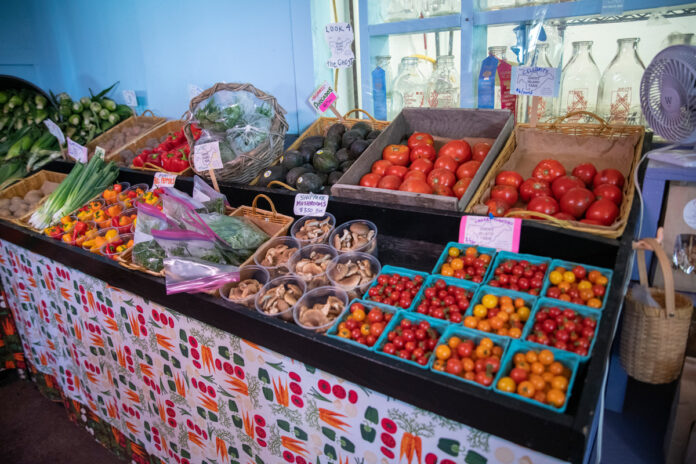Farms are not generally tidy places. Here and there, you might come across a stack of upended orange earthenware pots, a half-full bag of fertilizer, some well-worn shovels, or a hoe with a broken handle. Since Ghost Island Farm operates a farm stand that sells some purchased items as well as its own produce and other goods, on this farm there are also empty boxes and crates, paper bags for customers who don’t bring their own, signs and labels for what’s for sale, etc. And then, between greenhouses, there are the Seven Sisters of Doom — a row of mannequin heads on poles sporting real, if rather weather-beaten, human hair. Inside one greenhouse, there’s an uninflated plastic blow-up alien atop a folded, deflated pink flamingo pool. Outside that same greenhouse are a few large chunks of rust-red plastic intestines. Behind the farm stand are parked two hearses, one black, one baby blue.
This is, after all, Ghost Island Farm, the eight-year-old brainchild and labor of love of farmer Rusty Gordon, who loves all things Halloween. The farm’s logo is an upside-down Martha’s Vineyard outline with a spectral head on top, and the result, curiously enough, looks exactly like a ghost.
“I just have that kind of sense of humor,” explains Rusty. “I grew up on horror movies and Halloween was always big in my family. I loved the costumes. It’s all for fun.” Rusty’s Halloween displays at the front of his flower field at Nip ‘n’ Tuck farm (on State Road in West Tisbury), are legendary. Last year’s was a crashed spaceship scene, including smoke, fog, bubbles, and aliens emerging from the craft’s windshield.
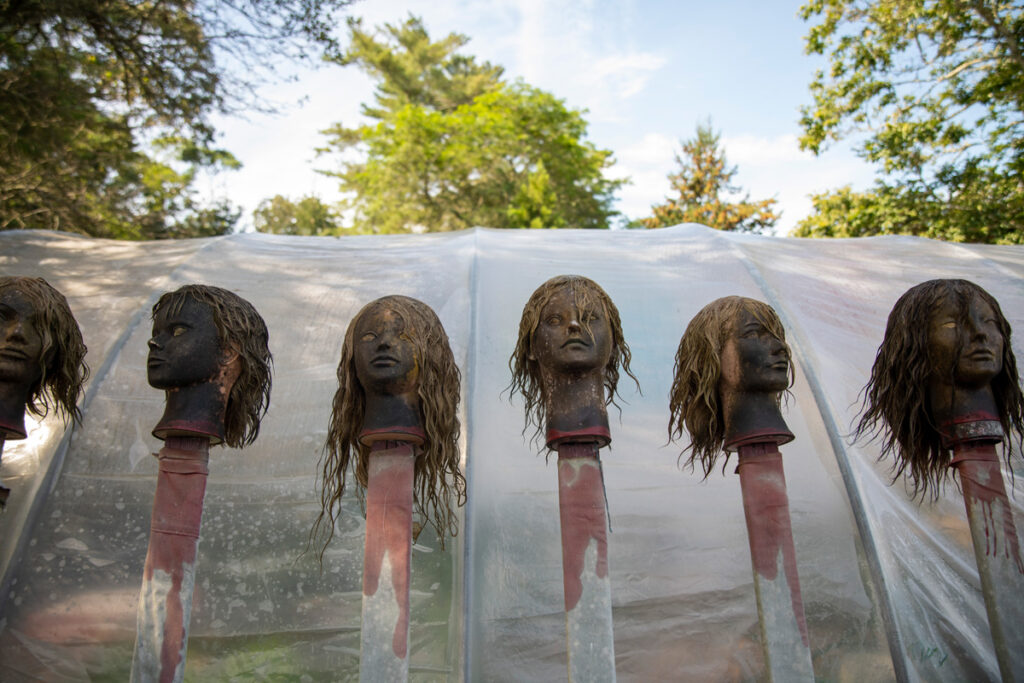
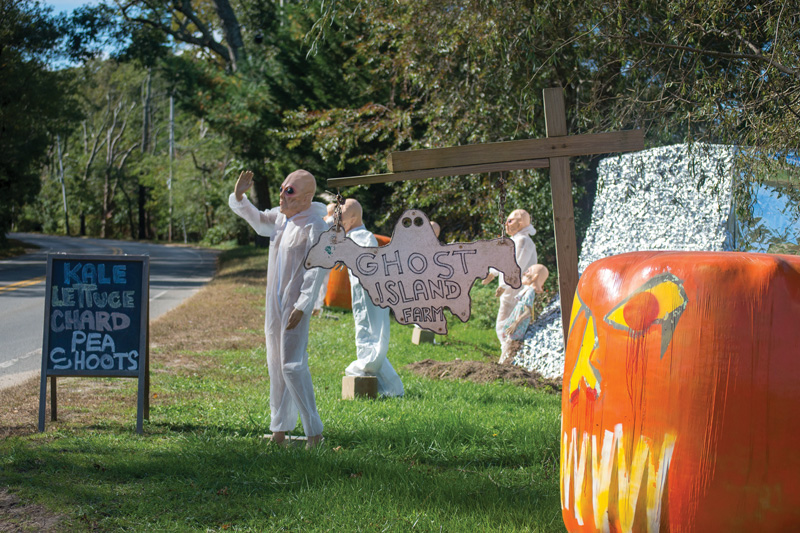
“It’s sad to see Halloween going away, so we’re trying to bring it back in, get the rest of the town – the whole Island! – going heavy on it. We do something really big out front, and we have a haunted farm stand inside. It brings us a lot of attention; people come from all over to see it. They’re always asking me what I’m going to do this year, but I won’t tell. I want it to be a surprise.”
There’s a lot about Ghost Island Farm that might seem surprising. Notably, there’s the farm’s original take on the CSA (Community Supported Agriculture) methodology. Members of a typical CSA pay a certain amount of money before the season starts; then, during the season, they periodically (usually weekly) pick up their “shares” in the farm’s output — generally a hodge-podge of whatever happens to be ripe and ready at the moment. While CSA members at most farms may enjoy the mystery of not knowing what they’ll be getting in a given week’s share, some have been heard to complain about not receiving enough of what they really need, or getting too much of things that interest them less. (What am I supposed to do with six pounds of kohlrabi?!) Another common problem with traditional CSAs is that if members aren’t able to pick up their goods on the day of distribution, they generally just have to miss that week.
“I didn’t want to do a CSA that would directly compete with Whippoorwill Farm’s,” says Rusty, who worked at Whippoorwill for over 20 years, eventually coming to run most aspects of the farm. “I just wanted to do things right and build a CSA that I thought was run the right way. So, with Ghost Island, we decided on this new method, which we call a co-op.” At the Ghost Island co-op, members pay $250 up front, and then, year-round, they can come to the farm stand and select whatever they want. At the register, they get 10% off the non-member price, and the amount of their purchase is deducted from their initial deposit. When they run out of funds, they simply deposit more money into their account. “This way,” Rusty notes, “they get everything fresh and just picked, and they can come in whenever they want — three times a day if they need to.”
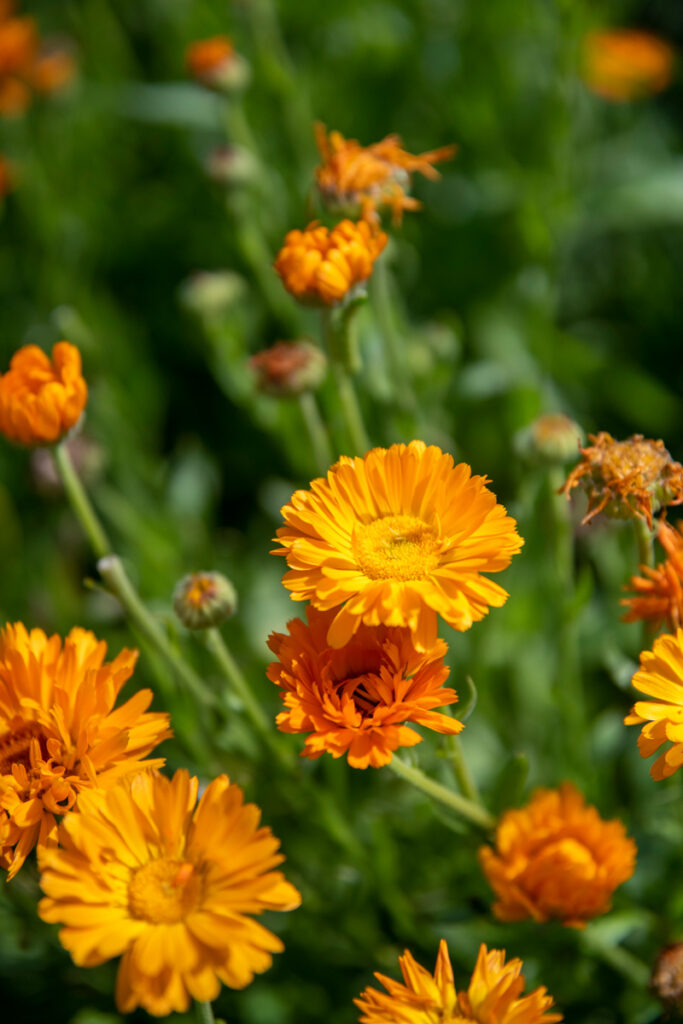
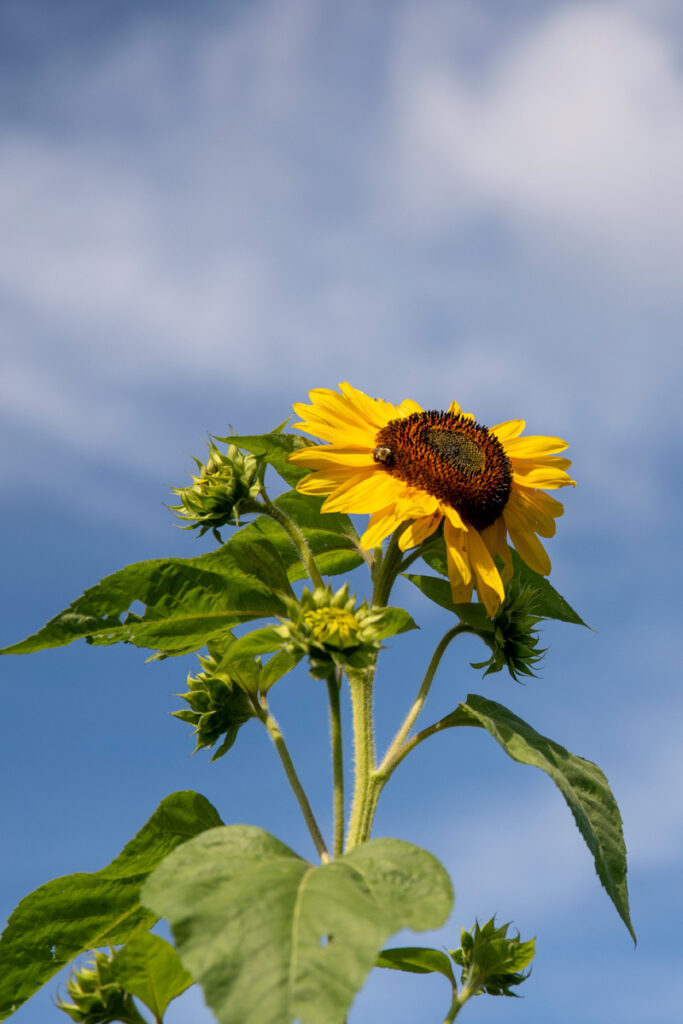
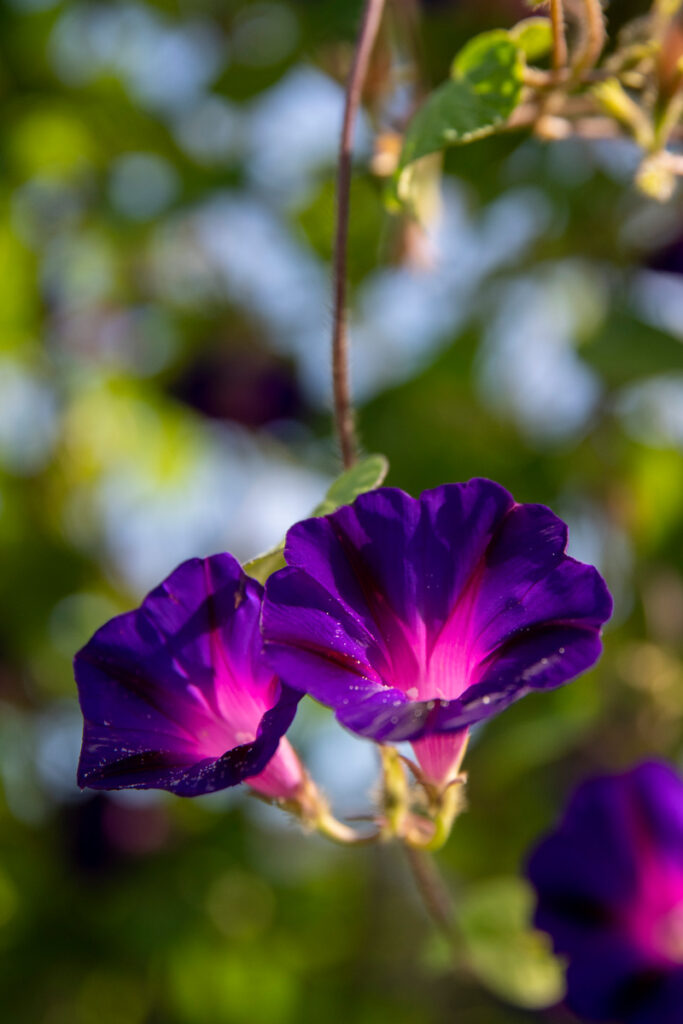
A special summer and fall member benefit is free, pick-them-yourself flowers. Members may come by any time with a pair of scissors and wander through the flower beds (both out front and in the back), taking home an armload of colorful flowers, including zinnias, poppies, and sunflowers. This aspect of membership benefits the farm as well as the members: members who come to pick their own flowers get to know the gardens in a personal way, which gives them a sense of “ownership” in the place and builds customer loyalty.
Rusty confesses to having been nervous about trying this new, untested co-op system. But he trusted his instincts. “I know what people like to eat, so I know what to grow. And letting people choose exactly what they want seems natural; there’s freedom in that.”
Start-up of Ghost Island was slow and nerve-wracking. After leaving Whippoorwill, Rusty began with a half-acre of land in Vineyard Haven for planting and a second piece of property where he could just fit two 40’ x 100’ greenhouses. He had “no money at all” to invest. “All I could afford was a couple of shovels and a hand rototiller,” he says. “It was a hard start.” Sarah Crittenden, his long-term girlfriend and now his partner at Ghost Island Farm, kept her job in landscaping for the first two years, so the couple would have some income to live on.
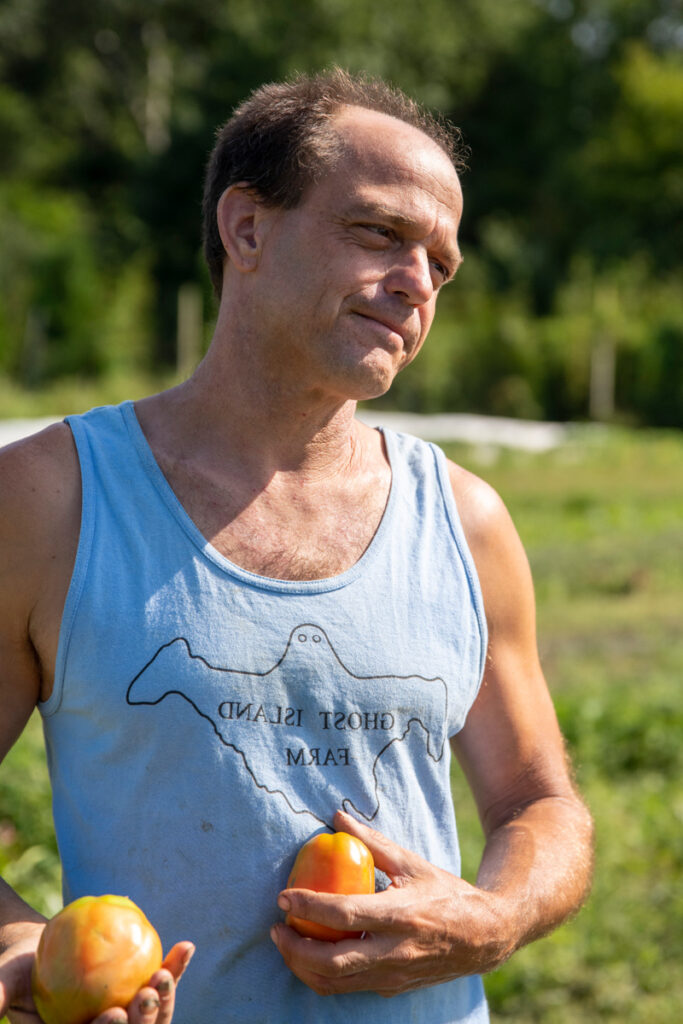
Rusty’s initial plan was, of necessity, to keep overhead at a minimum – to grow vegetables on his own and sell them at the farmers’ markets and wholesale to restaurants and grocery stores. But then his friend Freddy Fisher offered him some land to rent at Nip ‘n’ Tuck, and the rustic (read “in need of serious renovations”) building out front presented a different opportunity. Rusty decided to switch gears and use that building as his principal place of sale – “to have everything we have go into building up this place as a farm stand, with the farmers’ markets becoming secondary, for when we have extra stuff to sell.”
The first year was challenging. “We had tomatoes, sweet corn, everything … and no customers,” he remembers ruefully. “I’d watch people drive by all day long.” The problem, he figured, was that nobody knew he was there, or even that he had left Whippoorwill Farm. So he got to work letting people know. He put eye-catching signs by the road, and he launched an email campaign, sending notices and newsletters about his new take on the CSA to everyone he could think of. “We figured we’d get about 50 members, which would give us a little money at the beginning of the year when it’s really tough – when we need thousands of dollars to invest in seeds and supplies.” Other attention-getting tactics included driving his goods to the West Tisbury Farmers Market in a hearse. The black hearse put some people off; he figures it aroused their superstitions and made them steer clear of his stand. But when he switched to the baby blue hearse, things turned around. Now, people came to his stall just to photograph the car (a Cadillac) and ask questions about it.
“People said I’d never make it with a hearse, or with a name like Ghost Island Farm,” says Rusty, “but I’m kind of a stubborn person who loves a challenge. I want to be myself, and to succeed as myself.” It’s working: Ghost Island now has over 500 members.
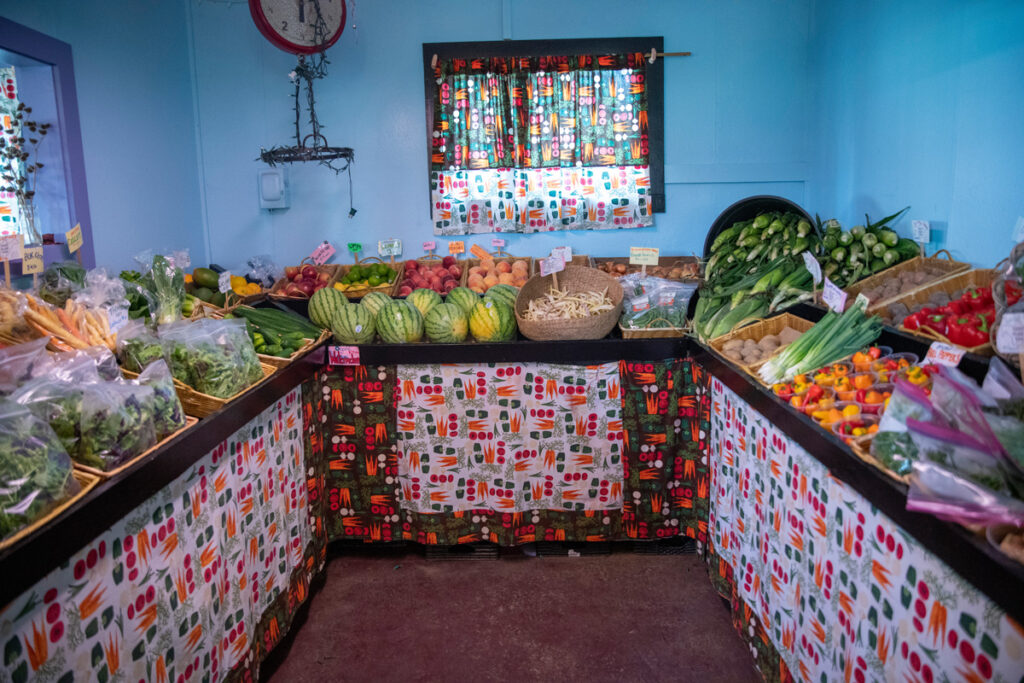
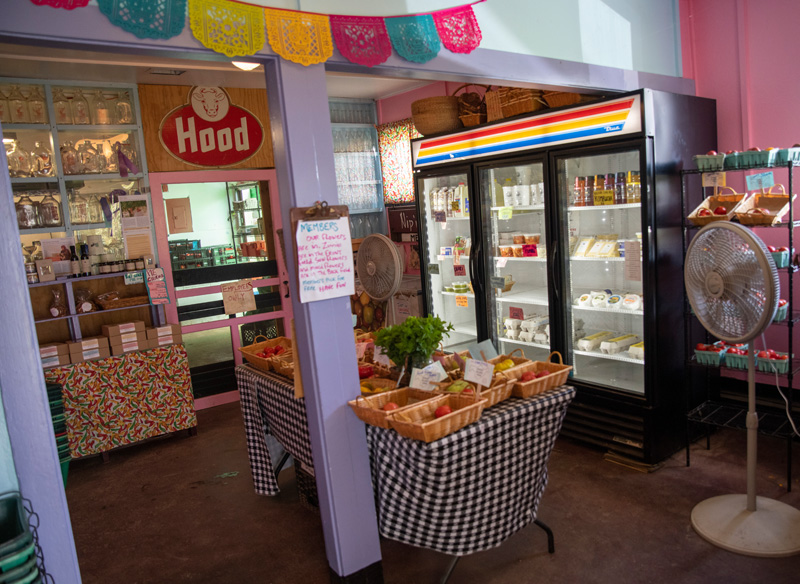
Anyone who wanders into the Ghost Island farm stand — whether a member or not — may be surprised at the variety of goods for sale. In addition to what’s grown on the farm, the stand offers other local farms’ produce to round out their own, plus popular fruits and vegetables grown off-Island, like avocados, shiitake mushrooms, and peaches. They also carry non-produce goods produced by the many friends Rusty has made at the West Tisbury Farmers Market — Mermaid Farm yogurt and cheese, sea salt from Down-Island Farm, jams from New Lane Sundries, plus local honey and fresh eggs from a variety of local chicken owners. Farm-logo t-shirts are also for sale, along with single-serve ice cream for customers with a sweet tooth needing instant gratification, and a range of soaps and balms that Sarah makes, using farm-grown ingredients like lavender and calendula.
“We have a lot of loyal walk-ins,” Rusty says. “They come back every year and say we’re their favorite place. Some people come here first thing when they get off the boat. They greet us like family.”
The produce Rusty grows is farmed using organic methods. “I’ve been farming for over 30 years,” Rusty says, “and I’ve never sprayed chemicals on anything.” He uses only organic fertilizers and potting soils, plants clover between rows to nourish the soil and provide pleasant walking paths, and uses biodegradable plastic where possible to control weeds, keep the soil warm, and prevent rapid evaporation of moisture. Rather than spraying with organic pesticides, he picks bugs off of plants by hand. (He points out that, given a choice between a bunch of basil that’s been sprayed with something organic, and a bunch of basil that hasn’t been sprayed, most people will choose the latter.) Sometimes, he gives the picked-off bugs to Freddy’s chickens. “I myself am a vegetarian,” Rusty says. “I never like killing anything, even bugs, but it’s gotten to the point where I have to.” He uses ladybugs, praying mantises, and other natural predators to keep the bugs in check, but still, he gets “buckets of them. Sometimes we even vacuum them up with battery powered hand vacs.”
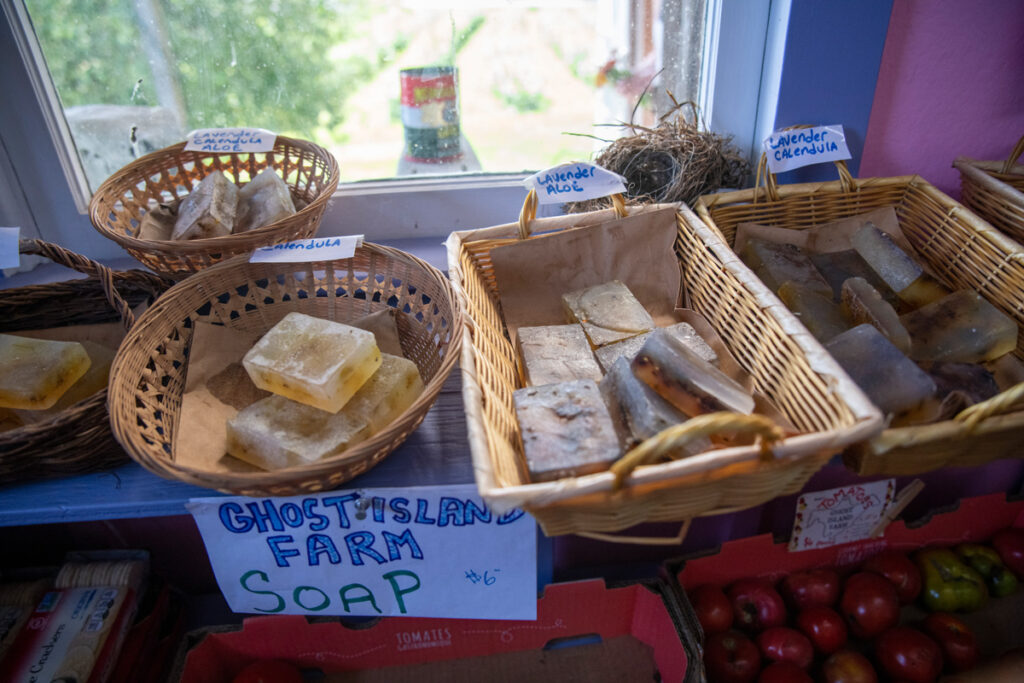
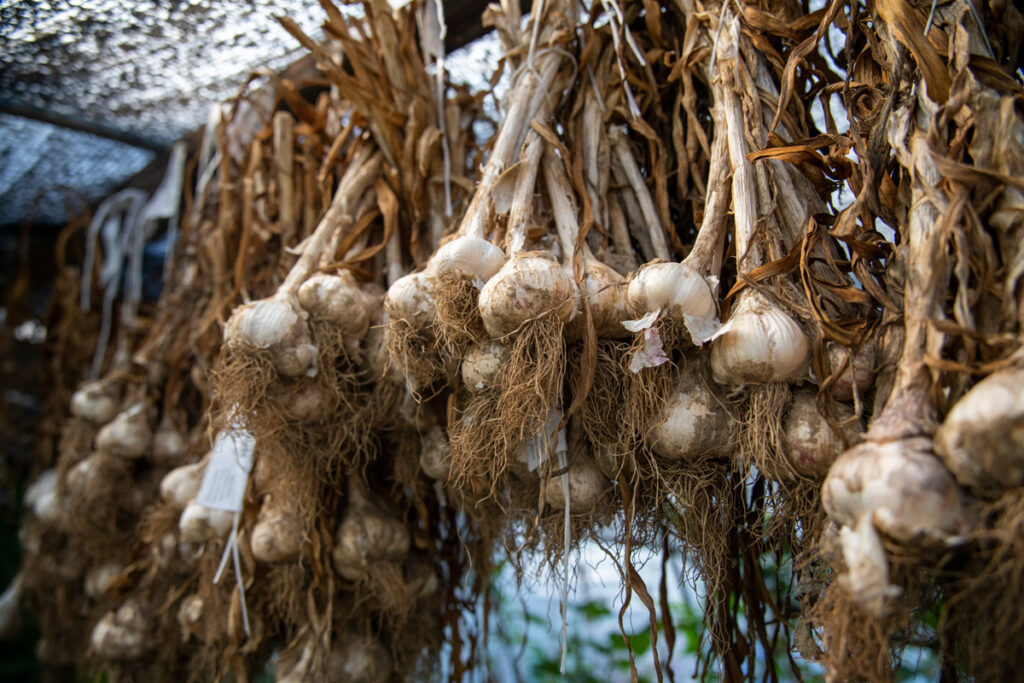
If this sounds like a lot of work, it is. This past season, Ghost Island had 12 employees, all working in various capacities at the farm stand, in the four acres of fields at Nip ‘n’ Tuck, and at Thimble Farm, where Rusty rents an additional five acres. Rusty himself is the farm’s hardest worker, toiling outside all day, seven days a week, until it’s dark, and then inside for a couple of hours after that. Attempts to take off a half-day a week have thus far proved fruitless, but, he notes, “at least it’s not like I’m working in the factory for The Man; it’s more kind of like we’re just living life.” This year, he and Sarah took their first vacation together in 8 years — since Ghost Island Farm started. The week before they left, “everything went wrong that could go wrong”. The electricity failed. The walk-in storage refrigerator broke down, as did the reach-in refrigerator in the farm stand. Between all of the other preparations that had to be made before leaving, plus the fact that they went camping, which is hard work in itself, by the time Rusty and Sarah returned, they were exhausted. “We thought, Geez, we’d be less tired now if we’d just stayed here and worked,” Rusty says with a laugh. “Next time, we’re going to tell everyone we’re going away, but we’ll just stay home, get an air conditioner, and lock ourselves in.”
Ghost Island Farm is known for its tomatoes, and with good reason. First, there’s the variety: This year, Rusty planted over 4,000 tomato plants, including some 200 different types, from classic red Big Boys to multi-colored heirlooms of all shapes and sizes. Second, Rusty has ripe tomatoes for sale for longer than most other farms, thanks to staggering his plantings for as long as possible, and to the seven greenhouses where he can grow things in cooler temperatures.
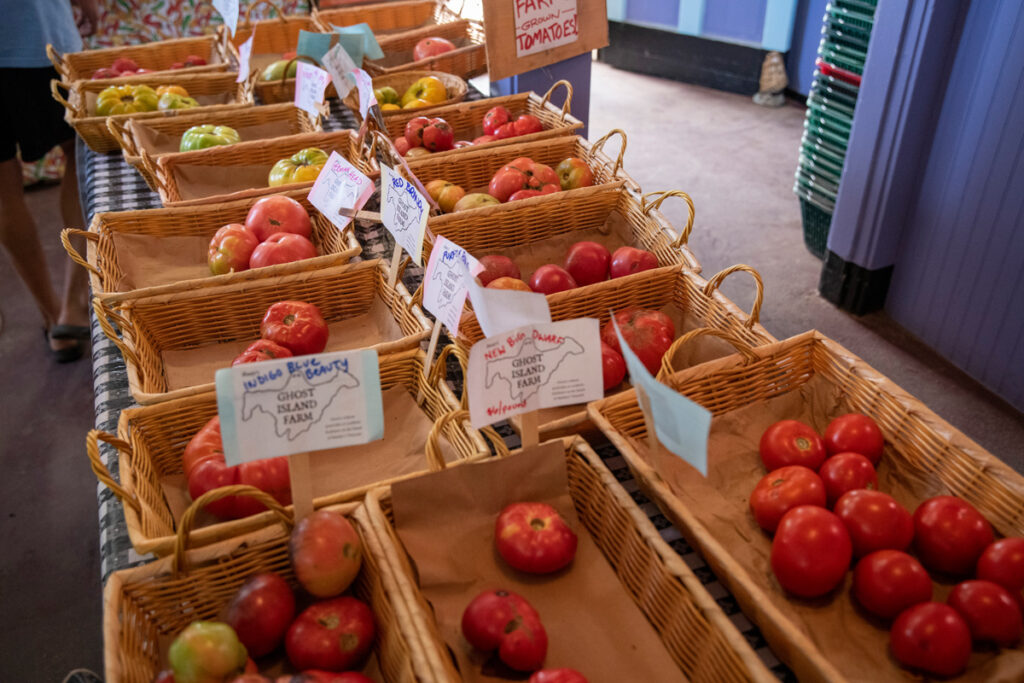
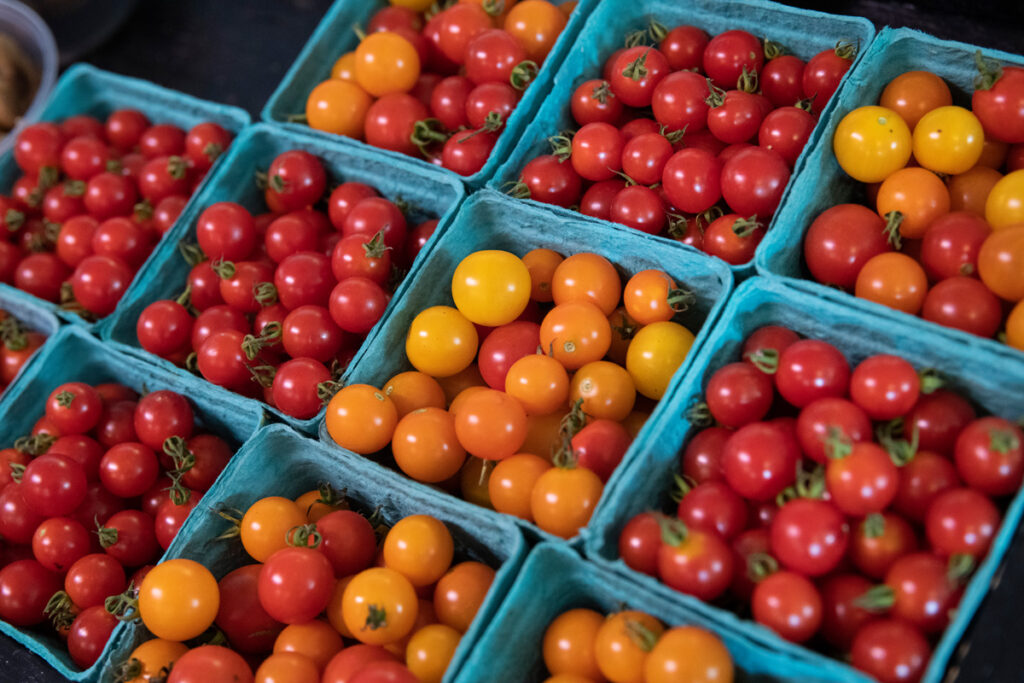
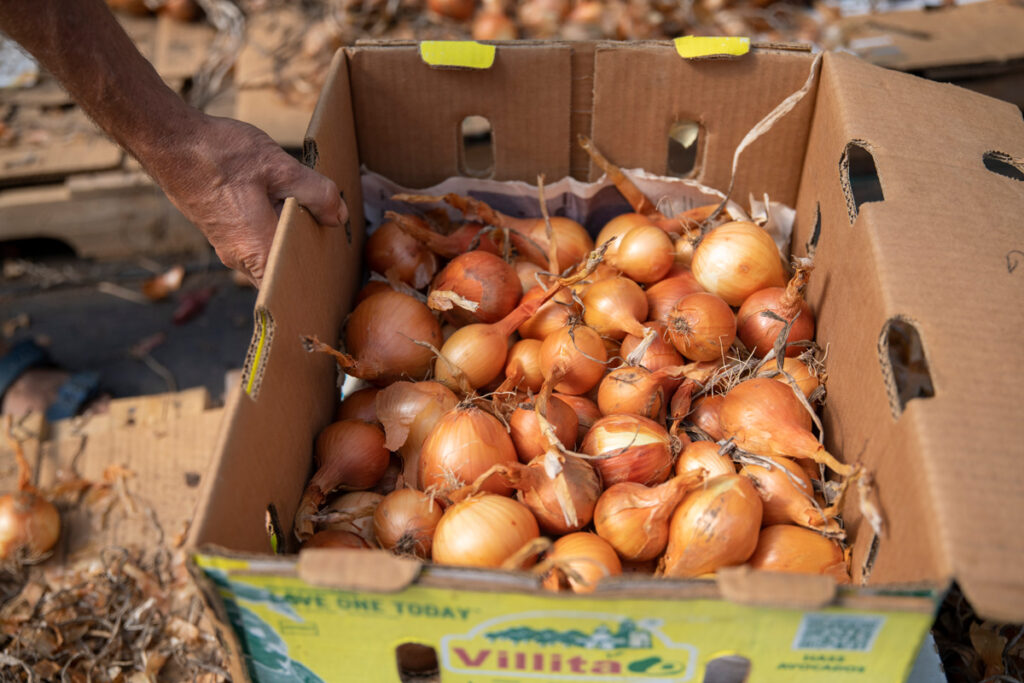
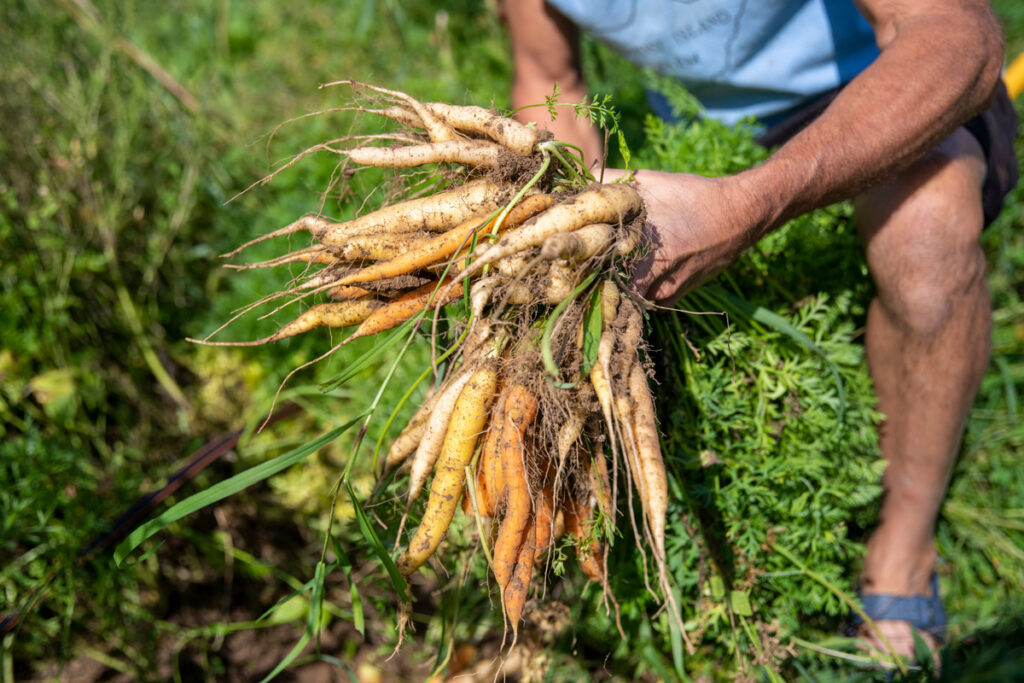
Those greenhouses have also made it possible for Ghost Island to stay open year-round selling its own produce. In the winter, the farm offers a variety of hearty greens including spinach, kale, chard, mustard, and collards, along with local cheeses and other items. The stand is open Saturdays and Sundays in the winter from 10-5, and often, given the popularity of the fresh Cinnamon Starship bread they carry in the off-season, there’s a line of people waiting in the parking lot at opening time. Keeping the farm open in the winter is a public service, but it also brings in necessary cash for purchasing seeds and equipment for the next summer season.
“We’re always pushing things to the limit,” Rusty says, “seeing what else we can do, what’s the latest we can grow something, what’s the earliest, what can survive in the greenhouses without heat.” Experimentation, Rusty points out, helps a farm keep ahead. Whenever someone at the farmers’ market has something new, he notes, everyone else has it by the next year. “You try not to fight Mother Nature, but when you experiment and it fails, you can’t let it bother you; it’s just the nature of the game. You can read whatever you want and look at what other people are doing, but if we’d only done that, we wouldn’t be as far along as we are today. You never really know what will work unless you try.”
Next up, Rusty would like to renovate the farm stand building, maybe put in a commercial kitchen. This will require funds that the farm doesn’t currently have. “We’re trying to figure out how to make it happen,” Rusty says. “We’re exploring options.”
Stay tuned!
















